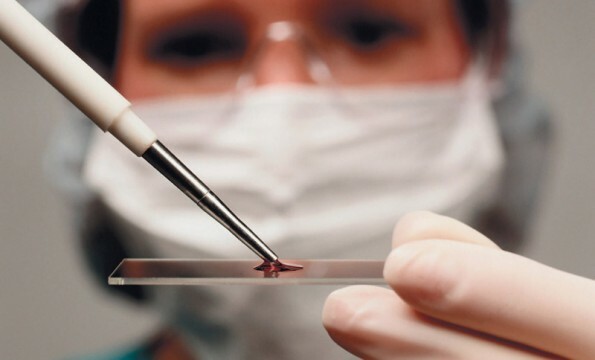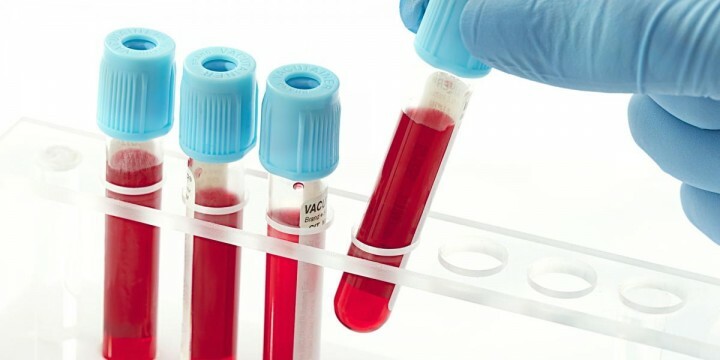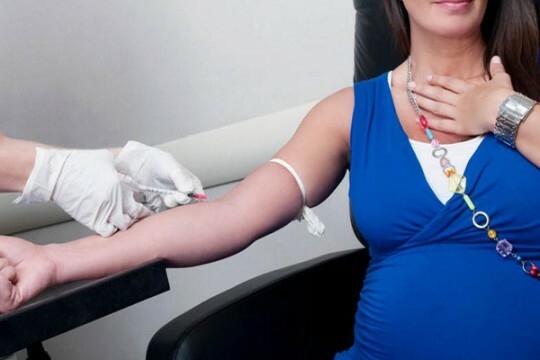hCG( human chorionic gonadotropin) is a specific hormone of the gonadotropic series, which is the main indicator of the onset of pregnancy. Normally, he is absent in the human body, and his presence in the blood says only two things:
- has become pregnant;
- is a threat of development of cancer, as some types of cancer cells are able to produce hCG.
For the most part, hCG is of interest to women specifically for determining the onset of pregnancy, so this issue will be considered in detail.
When to donate blood to HCG?

It is important to know that a pregnancy test is nothing more than the same analysis for hCG, only at home. Due to the sensitive reagent for hCG, which reacts with the urine of a woman to the presence of a gonadotropic hormone, can reveal whether the conception occurred early, even before the menstrual period of .Such pregnancy tests have a different sensitivity. Using the most sensitive tests, pregnancy can be determined before menstrual bleeding is delayed( sensitivity up to 10 mmol / milliliter), and the most common test strips have a sensitivity of up to 25 mmol / milliliter.
If you believe the unspoken statistics, then often tests for HCG for home conditions show false positive or false-negative results. False negative result is more common than false positive. Although the manufacturer claims that the probability of error does not exceed 1%, but, nevertheless, erroneous indicators exceed the declared percentage of the manufacturer. Therefore, it is not entirely reliable to rely on the fact that an express test at home will show a reliable result.
The most optimal analysis for determining the level of hCG in the body will be blood sampling. It is best to give blood for analysis in the morning on an empty stomach, like all other types of tests. The optimal date is at least 4-5 days after the start of the delay. The fact is that the level of hCG begins to grow only from the moment of implantation of the fetal egg into the uterine cavity, but not after the last sexual intercourse, or from the moment of the termination of ovulation. Before a fertilized egg can attach, it will take at least a week, or even one and a half, as its way through the fallopian tubes takes a considerable time. Since most women become pregnant in the middle of the cycle, when ovulation occurs, then implantation appears approximately before the onset of menstruation in the final phase of the menstrual cycle. Since the attachment of the fetal egg to the uterine cavity, the gonadotropin level begins to increase two times from the previous index. This means that if the indicator was 3 mmol / milliliter, then the next day will be 6 mmol, the third 12, etc.
Rates from 0 to 5 indicate the norm for a non-pregnant woman. From 5 to 25 - a controversial indicator, which requires the re-delivery of analysis at least a few days. That is why it is better to pass the norm to the chorionic gonadotropin not earlier than 4 days after the onset of the supposed menstruation. In principle, the delivery of the analysis before the delay is largely meaningless.
Why do I need to take an assay for gonadotropin?

Many women do not know why they are testing for this hormone after they find out that they are already in an interesting position. After all, most citizens believe that this analysis is done only to confirm or deny the existence of conception. This is fundamentally wrong. Thanks to these indicators, you can not only reveal the fact of conception, but also:
- to identify certain diseases;
- to follow the normal course of pregnancy;
- reveal a hidden threat to the fetus or the health of the expectant mother.
Much will be told about the overestimated or insufficient indicators at a certain time after the delay.
Before donating blood for analysis after conception, you need to make sure that the period of an interesting situation is set correctly, otherwise you can make a mistake, which is extremely undesirable, because a medical error costs a lot.
Elevated levels of gonadotropin
Elevated levels of chorionic gonadotropic hormone without abnormalities often indicate a multiple pregnancy. In other cases, the value rises:
- in cases of severe toxicosis;
- in case of suspected development of pathology in the fetus( for example, Down's syndrome);
- when the child is pregnant;
- in the presence of diabetes mellitus in pregnant women;
- for hormonal therapy for fetal life support;
- may be delayed after abortion;

The worst consequence for a future mother, of which high gonadotropin speaks is the risk of gestosis or eclampsia. Gestosis is a complicated form of toxicosis in later periods, which is characterized by:
- with a strong puffiness;
- is a violation of kidney function;
- sharp weight gain;
- increased blood pressure.
If the time does not begin to treat gestosis, then in dynamics it will cause eclampsia, which is characterized by a convulsive fit. If you do not provide medical care to a woman in time, she or her child will die. That is why it is so important to do a test for the level of gonadotropin during the period of gestation.
Lowered gonadotrophin level
A lowered level of chorionic gonadotropin may be indicative at an earlier time after delaying the ectopic attachment of the fetus. If the fetal egg is not located where it is necessary, then in any case an abortion will be made, otherwise the woman risks to die in the future from a rupture of the ovary or fallopian tube. A low level also indicates:
- about the threat of miscarriage;
- on placental fetal insufficiency;
- lag in the norms of intrauterine development;
- absence of intrauterine development;
- possible death of a child;
- fetal congestion on late dates.
In any case, if the result obtained does not fit into the deadlines, you need to urgently conduct an ultrasound study to finalize the situation. Also, if a diagnosis is made about the threat of miscarriage, you need to urgently go to the hospital for preservation. In no case can not ignore all the data gynecologist medical advice regarding treatment or further diagnosis.
How to take the test for the chorionic hormone
To get the most accurate result, you need to perform some simple manipulations.
- is not eaten until the blood is given 4-6 hours;
- is best to do blood sampling from the very morning;
- the day before the test, you must exclude any physical activity;
- before giving blood, you can not drink alcohol and smoke cigarettes;
- if hormonal preparations are taken as prescribed by a gynecologist, this must be reported to the laboratory technician.
After receiving the result on the hormonal diagnosis of the rate of the chorionic hormone, it is necessary to give the treating gynecologist all the data obtained for further medical conclusion. Independently to draw any conclusions and to conduct self-treatment is highly not recommended.



